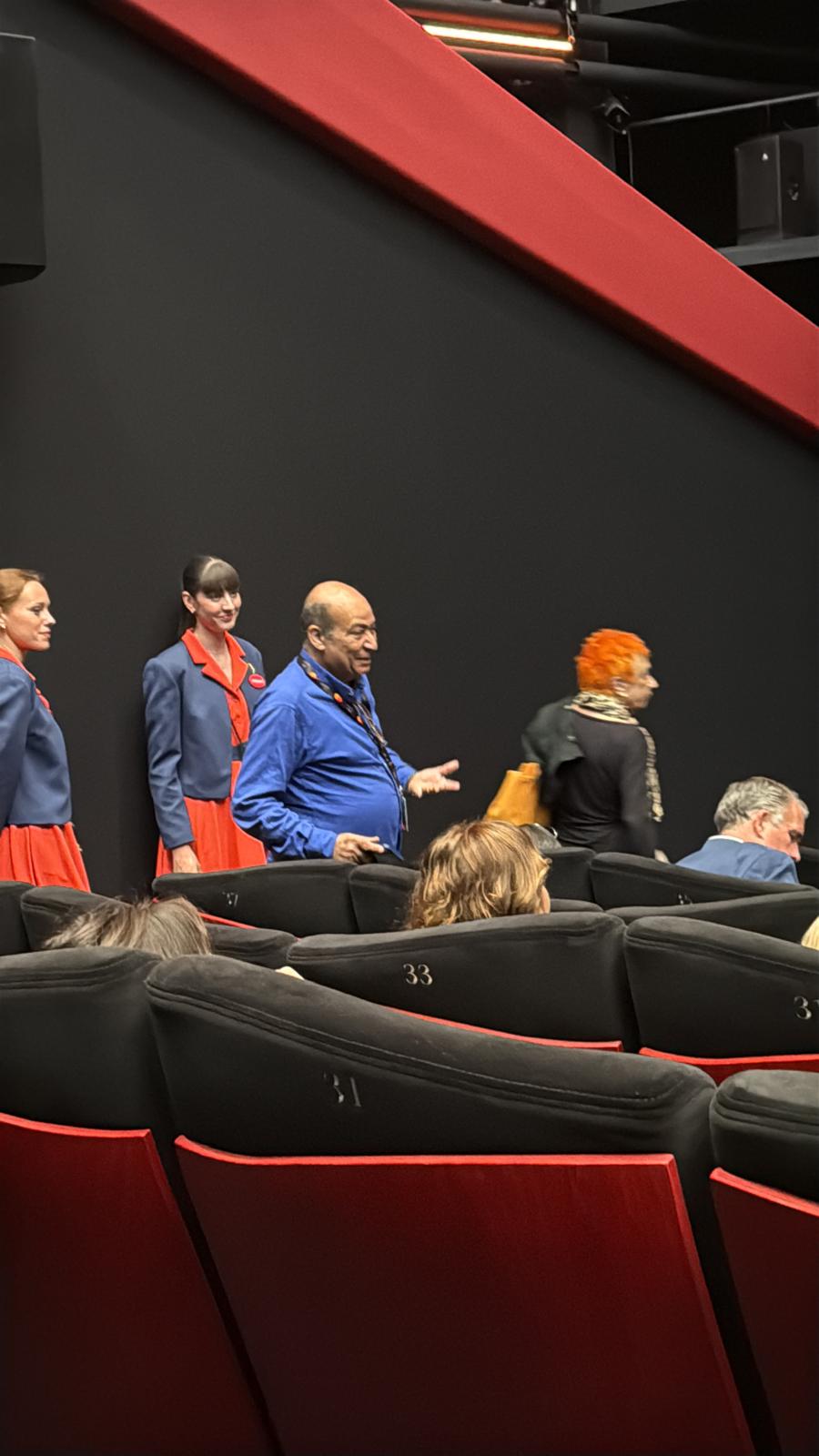بقلم أحمد سميح
في خارج قاعة السينما الرئيسية في مهرجان كان السينمائي لعرض فيلم نسور الجمهورية للمخرج السويدي من أصل مصري طارق صالح، كان هناك نوع آخر من التوتر الدرامي. توتر ليس على شريط 65 ملم، وإنما على شكل مكالمات هاتفية ورسائل واتساب تحدث بين مكاتب أمنية في القاهرة والجناح المصري في المهرجان.
جاءت الأوامر: قاطعوا الفيلم، تجاهلوه كأنه لا يُعرض، لا تتحدثوا عنه ولا تتحدثوا مع طارق صالح ولا مع فريق الممثلين. ولو صادفتم ألكسندر ديسبلا
(Alexandre Desplat)
لا تدعوا حاسة السمع تحرككم تجاهه، فصاحب الموسيقى التصويرية للعديد من الأفلام السينمائية، والحاصل على الأوسكار مرتين، شارك طارق صالح في جريمته أيضًا عبر سلاح الطبلة الخفيفة والفلوت.
أسماء كبيرة في عالم صناعة السينما المصرية خضعت فورًا للأوامر: حسين فهمي، يسرا، أحمد بدوي، وصبري فواز ابتعدوا تمامًا عن السجادة الحمراء وتلك القاعة التي سترتكب فيها جرائم ضد أمن الدولة والشخصيات الهامة في البلاد، كما أن هذا الشريط يستهدف قيم الأسرة المصرية.
في قاعة السينما، تحرر طارق الشناوي من كل هذه الأوامر، فالناقد الفني الأشهر في مصر يستطيع أن يتحرك كيف شاء، ودخوله قاعة سينما جريمة يرتكبها كل يوم.
بالتأكيد، صورة الرئيس السيسي في مقطع الفيديو الترويجي الذي استخدمته الشركات المنتجة كانت كافية جدًّا لبعض القلق. لكن، هل يخاف طارق الشناوي وفي جيبه مسودة مقال لصحيفة المصري اليوم بعنوان: “احتجاج أصحاب القمصان الصفراء ينافس على السعفة”، يتناول فيه فيلم قضية 137 الذي يهاجم الرئيس الفرنسي ماكرون؟
لم أستطع أن أوقف حدسي الصحفي من التقاط صورة لطارق الشناوي أثناء دخوله، وقبل جلوسه بين الصفوف الأولى على يسار القاعة، ليصبح هو وأنا وآخرون على يمين الشاشة الفضية بشكل يعجز بيير إيميه
(Pierre Aïm)
عن تصويره، فالقصة تحتاج إلى “زوم” على وجه طارق الشناوي.
بدأ الشريط في الدوران ليكتب لحظة تاريخية جديدة عن السينما المصرية صاحبة الـ129 عامًا، وكذلك عن الأجهزة الأمنية والقيادات العسكرية التي تحكم البلاد في كل شيء وبكل الطرق.
طارق الشناوي المتفرج يتماهى مع شخصية “جورج فهمي” بطل الفيلم، التي يتقمصها فارس فارس، الممثل السويدي اللبناني، والذي طالما نجح في العبور بين اللهجات واللغات والشخصيات. فقد كنت أعتقد مثلًا أنه ممثل باكستاني عندما تقمص شخصية “حكيم” في فيلم
Zero Dark Thirty.
كلاهما خائف من “الدكتور منصور”، شخصية مسؤول جهاز المخابرات العامة، والذي لعبه الممثل المصري عمر واكد بمستوى عالمي من الأداء التمثيلي يتجاوز جواكين فينيكس في فيلم الجوكر.
لعب طارق صالح بكل شجاعة معزوفته السينمائية السوداء، والتي تنقل واقعًا يتجرعه المصريون بمرارة كبيرة كل يوم، وفي حياة نفس الرئيس الذي تدور أحداث الفيلم في عصره، وهو أمر جديد على السينما المصرية والعربية.
السينما التي أدخلها إلى مصر الأخوة لوميير عام 1896، لتصبح مصر ثالث دول العالم في إنتاج السينما تاريخيًا، دخلت إلى أقبية المخابرات في عصر الجنرال السيسي، لتبحث عن “إنجازات الرئيس الوطنية” وتصارع الإخوان المسلمين. إخوة تذهب بنا للأمام، وإخوة تذهب بنا للخلف.
انتهى العرض بعد أن هدم طارق صالح تابوهات اجتماعية وسياسية سائدة في مصر. فالدولة المصرية التي ترسل الكثير من الرجال والنساء إلى السجون، لا تتحمل أن يُعرض فيلم سينمائي يظهر فيه البطل بشخصية ممثل مشهور “مسيحي”. كما أن هذا الطغيان الحاكم للقاهرة، عبر عاصمة إدارية تبنيها الصين، لا تتحمل “قيم الأسرة” لديها أن يدخل بطل الفيلم في علاقة محرمة مع سيدة مسلمة تتسربل في ملابس تخفي هويتها، لكنها في نفس الوقت ملابس ذات طابع ديني.
لم ينسَ طارق صالح أن يرسل رسالة مشفّرة لزملائه من المخرجين المصريين، فأشهر أفلام “جورج فهمي” هو الاختيار المستحيل، في رسالة غير مباشرة للمخرج “بيتر ميمي”، صاحب مسلسل الاختيار 1 والاختيار 2، وهي سلسلة من الدعاية العسكرية المحمولة عبر الشاشات، فيها القليل من الدراما والكثير من الكذب.
لكن إدارة الرقابة على المصنفات الفنية سمحت بعرض اختيار بيتر ميمي، ولن تسمح بعرض نسور الجمهورية لطارق صالح في مصر.
انتهى العرض، وصفق الجمهور قبل إضاءة القاعة لمدة دقيقة و18 ثانية، وبعد إضاءة النور استمرّ التصفيق الحار لمدة لم أستطع قياس طولها.
خرج الجميع من القاعة وكل شيء فجأة تلاشى… يا أستاذ طارق الشناوي… حتى أنت.
تنويه هام:
لم يكتب الأستاذ طارق الشناوي أي شيء في يوميات مهرجان كان عن فيلم نسور الجمهورية حتى نشر هذا المقال في 22 مايو 2025.
An Article Not Written by Tarek El-Shenawy
By Ahmed Samih
Outside the main cinema hall at the Cannes Film Festival, where Eagles of the Republic by Swedish-Egyptian director Tarik Saleh was screening, another kind of dramatic tension was unfolding—not on 65mm film, but through phone calls and WhatsApp messages exchanged between security offices in Cairo and the Egyptian pavilion at the festival.
Orders were issued: boycott the film, pretend it doesn’t exist, don’t talk about it, don’t speak to Tarik Saleh or the cast. And if you happen to run into Alexandre Desplat, don’t let your ears betray you—the Oscar-winning composer, known for his scores on many films, was complicit in Saleh’s crime through the gentle beat of a drum and the sound of the flute.
Big names in the Egyptian film industry immediately obeyed: Hussein Fahmy, Yousra, Ahmed Badawy, and Sabry Fawaz stayed far away from the red carpet and the hall where crimes against state security and the country’s dignitaries were supposedly being committed. This film, after all, was said to target the values of the Egyptian family.
Inside the cinema hall, Tarek El-Shenawy was free from all such orders. Egypt’s most prominent film critic could move as he pleased—and entering a cinema hall was a crime he committed daily.
Sure, President El-Sisi’s image in the promotional video used by the film’s producers was cause for some concern. But would Tarek El-Shenawy be afraid, with a draft article in his pocket titled “Yellow Vests Protest Competes for the Palme d’Or” for Al-Masry Al-Youm, discussing the film Case 137, which criticizes French President Emmanuel Macron?
I couldn’t stop my journalistic instinct from snapping a picture of Tarek El-Shenawy as he entered, moments before he took a seat in the front rows on the left side of the hall—placing him, myself, and others to the right of the silver screen in a configuration even Pierre Aïm would struggle to capture. This story required a zoom-in on El-Shenawy’s face.
The reel began to roll, documenting a new historic moment for Egyptian cinema, now 129 years old, and for the security and military apparatus that governs the country in all things and by all means.
The spectator Tarek El-Shenawy found himself merging with the film’s protagonist, “George Fahmy,” played by the Lebanese-Swedish actor Fares Fares—an actor known for his seamless shifts between dialects, languages, and identities. At one point, I truly thought he was Pakistani when he portrayed “Hakim” in Zero Dark Thirty.
Both men were afraid of “Dr. Mansour,” the intelligence officer portrayed by Egyptian actor Amr Waked in a performance so powerful it eclipses Joaquin Phoenix’s in Joker.
Tarik Saleh courageously composed a dark cinematic symphony that conveys a bitter reality Egyptians endure daily—set during the rule of the very president whose era the film depicts. This is unprecedented in Egyptian and Arab cinema.
Cinema was first introduced to Egypt by the Lumière brothers in 1896, making the country the world’s third in film production historically. Now, under General El-Sisi’s rule, it has entered the corridors of state intelligence—searching for the president’s “national achievements” and waging war on the Muslim Brotherhood. Some brothers push us forward, others backward.
The screening ended after Tarik Saleh shattered Egypt’s entrenched social and political taboos. The Egyptian state—one that sends countless men and women to prison—could not tolerate a film whose hero is a famous actor playing a Christian character. Nor could the regime ruling Cairo, from a new administrative capital built by China, accept a narrative where its so-called “family values” are challenged by a forbidden romance between the protagonist and a veiled Muslim woman—her identity concealed under religious attire.
Tarik Saleh didn’t forget to send a coded message to his fellow Egyptian filmmakers: George Fahmy’s most famous film is titled The Impossible Choice, a clear nod to director Peter Mimi and his TV series The Choice 1 and The Choice 2—military propaganda wrapped in cinematic packaging, light on drama and heavy on lies.
While Egypt’s censorship board allowed Peter Mimi’s The Choice to air, it will never allow Eagles of the Republic to screen in Egyptian theaters.
The screening ended, and the audience applauded for one minute and 18 seconds before the lights came on. Then, the clapping continued—I couldn’t measure how long.
Everyone left the hall, and suddenly everything vanished… even you, Mr. Tarek El-Shenawy.
Important Note:
As of the publication of this article on May 22, 2025, Mr. Tarek El-Shenawy has not written a single word in his Cannes diary about the film Eagles of the Republic.





